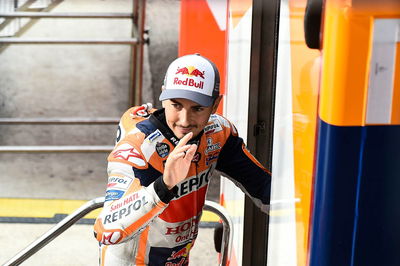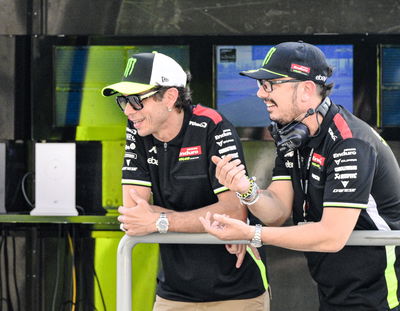Best of 2010s: MotoGP’s superstars of the decade
In one of the all-time greatest decades of motorcycle grand prix world championship racing, the face of the sport has changed remarkably from the move to 1000cc four-strokes in MotoGP in 2012, to the introduction of the single-specification Magneti Marelli electronics package and switch to Michelin tyres in 2016.
125cc and 250cc were replaced and reinvigorated by transformations into Moto3 and Moto2 respectively, while the race calendar has inflated and is likely to remarkably grow again in the next decade.
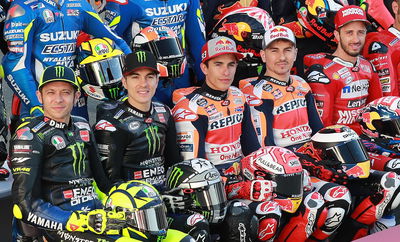
In one of the all-time greatest decades of motorcycle grand prix world championship racing, the face of the sport has changed remarkably from the move to 1000cc four-strokes in MotoGP in 2012, to the introduction of the single-specification Magneti Marelli electronics package and switch to Michelin tyres in 2016.
125cc and 250cc were replaced and reinvigorated by transformations into Moto3 and Moto2 respectively, while the race calendar has inflated and is likely to remarkably grow again in the next decade.
Trying to compile an organised list of the greatest riders in Grand Prix racing over the 2010s decade is a subjective and statistical task asterisked by a multitude of ifs and buts. Weighing up all records and achievements – taken purely from the 2010-2019 seasons – it is clear a couple of names surge to the top. This list also hopes to provide a fair reflection on all members of the Grand Prix paddock including the rise and fall through the ranks.
Honourable mentions
Before delving into the top 10, a couple of nods to those who didn’t quite make it but deserve a mention for their success over the decade. Both Alex Rins and Jack Miller are MotoGP race winners having competed for world titles during their careers in the smaller classes and are considered the first wave of young riders, with a mention for Fabio Quartararo too, set to challenge Marc Marquez’s current domination.
10. Cal Crutchlow
World Titles: 0
Race Wins: 3 (2011-present MotoGP)
Cal Crutchlow can claim to have one of the most eventful decades in the sport after switching over from the World Superbike championship to join Tech3 Yamaha in 2011. After a solid rookie year adjusting to Grand Prix racing, the British rider secured the team’s best results with numerous podiums and pole positions.
His efforts caught the eye of Ducati who made a move for him in 2014 and while the combination didn’t work out for Crutchlow, who split amicably from the Italian manufacturer one season into a two-year deal, it saw his career align with LCR Honda at the midpoint in the decade.
Since then Crutchlow is just one of two Independent team riders in the 2010s to taste victory (along with Miller with his historic Assen 2016 triumph) and has consistently been the strongest non-factory rider on the grid over the past five years highlighted by three wins including that emotional maiden success in 2016 at Brno.
Crutchlow has also fought back from a nasty injury when he suffered a badly broken ankle at Phillip Island in 2018 with a gruelling winter recovery resulting in a podium finish on his comeback in Qatar at the 2019 opener.
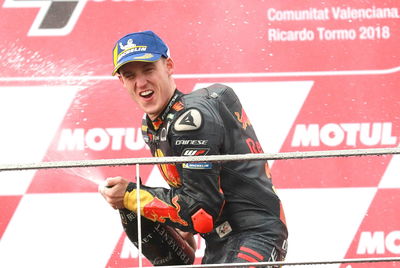
9. Pol Espargaro
World Titles: 1 (2013 Moto2)
Race Wins: 13 (3x 125cc, 10x Moto2)
A rider who has always maximised his situation regardless of the challenges faced, Pol Espargaro can be considered an unsung hero of the decade despite just a single podium appearance in the premier class.
At the start of the decade the Spanish rider’s final year in the lightweight class saw a world title challenge come up short in third place behind champion Marquez and despite a tough rookie season in Moto2 on unfancied FTR machinery Espargaro claimed two podiums which convinced the Pons Racing squad to sign him up for 2012.
Once again, a title attack was thwarted by Marquez but just one season later Espargaro claimed his Moto2 world crown seeing off both Scott Redding and Tito Rabat.
That led to Tech3 Yamaha snapping him up and Espargaro instantly delivered by finishing top rookie and sixth place in the overall MotoGP standings.
A further two years at Tech3 produced similar results, along with a pair of Suzuka 8 Hours wins, but with his path blocked to a factory ride at the Iwata factory Espargaro made the bold move to the all-new KTM MotoGP team.
While its been a tough journey over the last three seasons with the Austrian manufacturer, both are producing clear progress climbing the MotoGP ranks with the Spaniard notching up a century of points in the 2019 campaign.
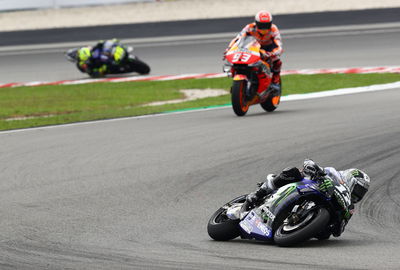
8. Maverick Vinales
World Titles: 1 (2013 Moto3)
Race Wins: 23 (4x 125cc, 8x Moto3, 4x Moto2, 7x MotoGP)
Another star rider from the Spanish conveyer belt of talent from the 2010s, excluding his rookie MotoGP campaign in 2015 Maverick Vinales has finished inside the top four in the championship standings in every campaign he’s contested on the world stage.
Wins in every category from 125cc to MotoGP make the 24-year-old’s CV sparkle. 63 podiums from 158 race starts this decade gives Vinales a 39.87% rostrum success rate and given he’s only stayed in the same championship and/or team for three seasons at the most shows an instant and impressive adaptation rate.
Given Vinales’ consistency and success it is perhaps surprising to see his world title count at just one – the 2013 Moto3 crown – with plenty of near misses in between. Vinales was top rookie in each year he debuted in a new category, while completing only one year in Moto2 before getting his change at Suzuki in the premier class is a fair excuse for the lack of silverware in the intermediate class.
But when it has come to MotoGP, a Marquez-shaped rival has been the class of the field that Vinales nor many of his fellow competitors have been able to topple.
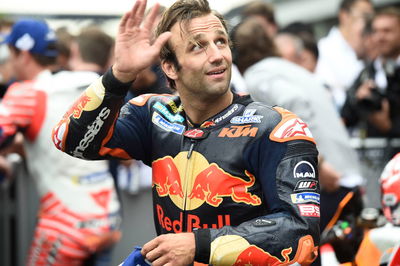
7. Johann Zarco
World Titles: 2 (2015 and 2016 Moto2)
Race Wins: 16 (1x 125cc, 15x Moto2)
Quickly becoming MotoGP’s biggest enigma, there’s no doubting Johann Zarco’s talents on a motorcycle and when everything slots into place with the French rider he becomes a world-beater. This was clear to see when he charged to back-to-back Moto2 world titles with the move to Ajo Motorsport and on to the Kalex chassis that proved to be pivotal having previously spent three years in the intermediate class taking a total of six rostrums across 52 races.
Having starred in multiple series throughout his career, including his 2007 Red Bull Rookies Cup win and his 2011 125cc world championship runner-up result, Zarco’s purple patch appeared to continue in his transition to MotoGP with Tech3 Yamaha, probably the most rider-friendly motorcycle on the grid, as he became the standout performer of the non-factory contenders.
Naturally a factory seat beckoned but like Espargaro before him Zarco found his path up the Yamaha ladder blocked so opted to join the Spaniard at Red Bull KTM in 2019 in a move which turned out to be ill-fated as he left the team after only 13 races into a two-year deal.
All eyes will be on Zarco at the start of the next decade to see if he can rediscover his old self in the new territory of Avintia Ducati after being passed over by Honda.
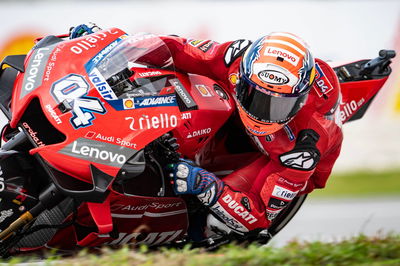
6. Andrea Dovizioso
World Titles: 0
Race Wins: 13 (2010-present MotoGP)
One of just four ever-present riders in MotoGP this decade who has excelled with experience in his later years equipped with an emerging Ducati package.
Fighting for the MotoGP world title over the past three seasons, Dovizioso has become a consistent podium presence having overseen Ducati’s progress after losing its way somewhat in the post-Stoner 1000cc era.
A breakthrough win at Sepang in 2016 paved the way to one of the closest title battles of the decade in 2017 as Dovizioso came up short crashing at the Valencia finale fighting with the odds stacked against him.
While the past two seasons have struggled to satisfy the higher expectations placed on the Italian, he’s been the only rider to consistently take the fight to Marquez during his dominant period.
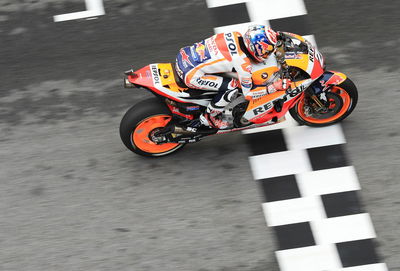
5. Dani Pedrosa
World Titles: 0
Race Wins: 23 (2010-2018 MotoGP)
Almost an ever-present at the MotoGP sharp end having only missed 2019 following his retirement, Dani Pedrosa’s 2010s will be remembered as a wonderful rider but what could have been.
Two runner-up championship finishes (both to Jorge Lorenzo in 2010 and 2012), Pedrosa completed just four out of nine seasons without missing at least one race through injury. Despite his fallibility to injuries the Spaniard still notched up a remarkable tally of wins and podiums with 2018 denting his perfect record of scoring at least one podium in every season of his career.
Pedrosa spent his entire premier class racing career at Repsol Honda but with the arrival of Marquez on the opposite side of the garage the team’s focus and bike design quickly shifted away from the #26 to the #93 as Pedrosa had to settle for the number two role.
Away from racing, Pedrosa has been credited as a key factor in KTM’s recent developments after becoming a test rider for the Austrian brand at the start of 2019 as he heads towards retirement.
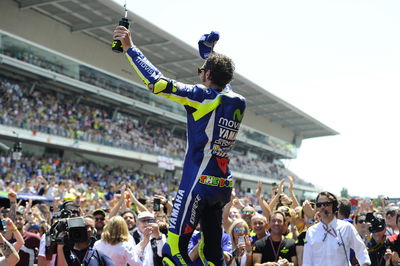
4. Valentino Rossi
World Titles: 0
Race Wins: 12 (2010-present MotoGP)
When Valentino Rossi entered the 2010s, fresh from seven MotoGP world titles from 10 years in the premier class, nobody would have expected the Italian’s championship tally to remain unchanged.
Never far from the sharp-end and often battling at the front, Rossi’s near-misses are well documented across this decade which include three consecutive runner-up championship finishes across 2014-2016.
With the exception of the infamous 2015 MotoGP season, looking over the Doctor’s decade in 2011 as reigning world champion he looked certain for another title tilt until a nasty 120mph crash in practice at Mugello when he sustained a broken leg and was forced out of action for four rounds.
Rossi’s two-year stint at Ducati never provided the hope of the Italian dream team with the Tavullia rider returning to Yamaha with cap in hand in 2013.
As the Italian regained momentum at the Iwata factory team, 2015 will remain as one of the greatest and most controversial seasons of all-time with Rossi at the centre of it. With three rounds to go Rossi had an 18-point lead over teammate Lorenzo but after the Australian Grand Prix Rossi shocked the world by accusing Marquez of deliberately holding him up to give an advantage to Lorenzo.
Having clashed on track in Argentina and the Netherlands earlier that year it came to a head in Malaysia in a collision which saw Marquez fall and Rossi was given three penalty points which result in a back of the grid penalty for the season finale in Valencia – giving him the almost impossible task of beating Lorenzo to the title.
Despite the lack of world title glory, Rossi’s longevity is a remarkable achievement as he prepares to start his fourth different decade of racing at world level as he turns 41 before the start of the 2020 MotoGP campaign.
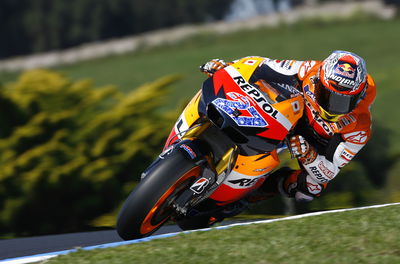
3. Casey Stoner
World Titles: 1 (2011 MotoGP)
Race Wins: 18 (2010-2012 MotoGP)
Casey Stoner may have only competed for the first three seasons of this decade but he still achieved more than most would ever dream of across an entire career.
A final year at Ducati in 2010 saw Stoner seek a fresh start which paved the way at Repsol Honda as he returned to the manufacturer with whom he made his premier class debut back in 2006.
Stoner and the RC212V became the perfect match as the Australian charged to his second MotoGP world title in 2011 with 10 wins – missing out on the podium just once all season – to secure his second MotoGP crown.
Despite a strong start to his title defence in 2012 with wins at Jerez and Estoril plus a podium in Qatar, Stoner stunned the paddock and watching world at the fourth round at Le Mans by announcing he would retire from the sport at the end of the year having fallen out of love with MotoGP.
An ankle injury which required surgery effectively ended his world title hopes as he missed three rounds but the Australian rider went out on a high with victory at his home track of Phillip Island and ended the season third in the standings.
While Stoner has since held testing roles at both Honda and Ducati, along with an ill-fated return to two-wheel racing at the 2015 Suzuka 8 Hours as he suffered a crash triggered by a Honda mechanical issue, the Australian rider has relished his retirement with his young family. More recently Stoner has revealed he’s been battling a chronic fatigue illness.
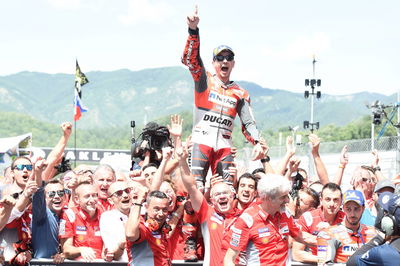
2. Jorge Lorenzo
World Titles: 3 (2010, 2012 and 2015 MotoGP)
Race Wins: 42 (2010-2019 MotoGP)
Jorge Lorenzo may have broken into the Grand Prix scene as far back as 2002 but the Spaniard became a monumental part of MotoGP’s history this decade.
The first MotoGP world champion of the decade produced a dominating campaign rarely seen before and the #99 has been at the forefront of the sport ever since.
Five world titles in total, three coming in the 2010s, cement Lorenzo’s status as an all-time great and he holds the unique feat of winning world titles against Stoner, Rossi and Marquez while all in their prime.
The Majorcan rider also made his mark on evolving the riding style in the premier class, taking a smooth and flowing cornering attack which equipped with the Yamaha M1 made him unstoppable during his title-winning campaigns.
A move to Ducati in 2017 ended up becoming a story of what could have been after the Bologna factory lost patience with him at the exact time the stars aligned with a memorable win at Mugello.
But as almost every rider has experienced the combination of heavy crashes and an aging body which doesn’t recover as quickly as required, not to mention the heavier blows landed on their mental fortitude to keep pushing to the limit, Lorenzo’s decade came to a disappointing end during his ill-fated move to Repsol Honda.
While Lorenzo’s call to retire from racing at the end of 2019 came as a shock his reasons behind the decision were never questioned, with many just hoping for a final hurrah rather than the damp finale which followed.
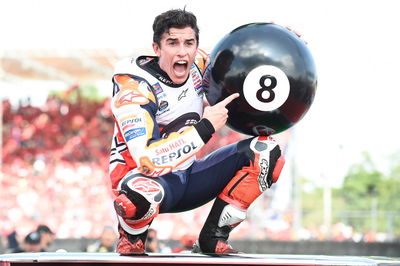
1. Marc Marquez
World Titles: 8 (2010 125cc, 2012 Moto2, 2013, 2014, 2016, 2017, 2018 and 2019 MotoGP)
Race Wins: 82 (10x 125cc, 16x Moto2, 56x MotoGP)
Perhaps the easiest name to place in this list’s order due to his dominance, consistency and world titles since the start of the decade.
Marc Marquez had been tipped for greatness from a young age and after two years in 125cc finding his feet the Spaniard began to fulfil his potential in 2010 when he charged to the world title in the lightweight class with a devastating 10 wins in 17 races.
With eight world championships to his name Marquez has only endured two years in the 2010s without ending it as a world champion – 2011 and 2015 – with his first miss coinciding with an incident which threatened to end his career.
After a crash on an unmarked section of wet track at Sepang during practice, while the Moto2 title on the line against Stefan Bradl, Marquez effectively missed the final two rounds of the season with vision problems which led to numerous medical checks over the course of five months.
Marquez recovered in time for the start of the 2012 Moto2 season and rediscovered his former self to dominate to the riders’ world title to pave the way for his move up to MotoGP with Repsol Honda.
What followed has been an era of almost total control from Marquez as he continues to rewrite the history book.
While the Cervera-born rider has enough feats for his own record book the standout achievements include: the youngest premier class race winner, the youngest world champion in the premier class, the most pole positions of all-time, the most podium finishes in a single season and the most consecutive race wins in the premier class (in the 4-stroke MotoGP era).
Marquez has also been in the sport’s limelight for controversial reasons – a situation which erupted with Rossi during the climax to the 2015 season – along so many spectacular on-track moments from stunning saves to nasty crashes.
As a result, Marquez heads into a new decade with further history beckoning after moving into sixth place on the all-time world titles list this year. Giacomo Agostini’s mind-blowing 15 world titles record still looks a distant and unlikely target but if (a rather big if it must be said) he repeats his 2010s title success rate he will surpass the iconic Italian’s haul before the end of the next decade.
